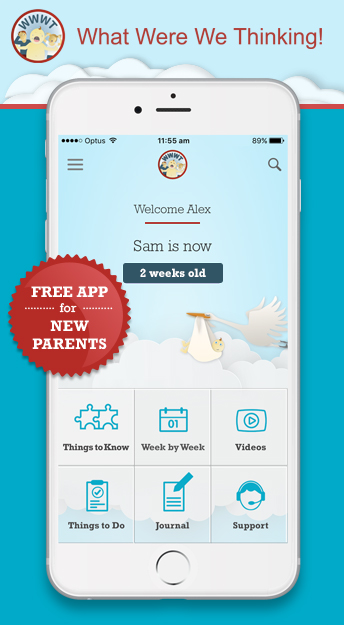Your baby, your body & your boundaries
By Stacy

My birthing story, to begin with, wasn’t what I expected it to be. The whole experience was pretty clinical, despite my husband having made a playlist with 8 hours of ‘Coldplay’ to set the scene!
Our baby was in a posterior position, which 9 times out of 10 makes it impossible to deliver naturally. Apparently the way the baby is positioned in the womb makes it one of the most excruciating kinds of labour to endure so I was given an epidural. Being stuck to a machine, with 6 or 7 people in the room and not being able to move my legs, wasn’t exactly how I pictured the birth to be.
As the labour progressed, our son got distressed with his heart rate dropping at each contraction. The umbilical cord was over his shoulder and getting pinched so our obstetrician needed to get him out straight away. They put forceps in and literally rotated him 180 degrees while he was still inside me. I couldn’t feel anything from the epidural, which was strange, and then before I knew it, they’d pulled him out.
The next part will be useful for mums to hear because I don’t think I ever considered that I may need a recovery myself. I was so focused on the labour when I was pregnant that I didn’t consider any pain or discomfort I may have been in after delivering and things I may have needed to put in place to make home life easier.
Basically for the first 3 weeks after having him I couldn’t walk properly or sit down without being in a lot of pain. I was on really strong pain killers because not only did I have an episiotomy, I had quite a lot of bruising from the forceps being so rough.
There were times when I said to my husband, “How long is it going to be like this, how long is it going to hurt for?” A week after having the baby, at a standard home visit made by a maternal nurse, I was told that with a posterior birth like mine it was normal for the pain to last up to 6 weeks. Hearing that was pretty difficult.
It was hard for me, not only because I had a newborn that I wanted to enjoy and go on walks in the pram with, but because while it was all so personal for me everyone wanted to talk about it.
When visitors started coming over to see the baby, I felt that I either had to put on a brave face and act like everything was fine or answer their questions about the labour without sounding rude. A few people who I wasn’t all that close to asked me whether I needed “stitches” and I find that quite personal. I was happy to tell my family and close friends, but my husband, as an example, was asked by a friend of his mother’s – whom I’d only met once - whether there was “any tearing” and “how many stitches did I need?”
I struggled with the fact that all of a sudden people you don’t even necessarily know feel like your body should be public knowledge or should be available to them.
I didn’t want to share with them that I was so uncomfortable and in extreme pain. People who were close to me, yes, because I knew they would have babies one day too and knew they just wanted to be prepared. But then other people, well I just glossed over it all and said that while I’d had an episiotomy I had healed just fine.
Expert response from What Were We Thinking! expert, Ann O'Doherty
Thank you Stacy for sharing your birth experience. As parents we expect the first weeks after we have our babies to be happy and exciting and it can be difficult when pain and trauma from a difficult birth effect our enjoyment of new parenthood.
Motherhood comes with many challenges but one that is not spoken about all that often is the physical and emotional recovery from birth, especially when events haven’t gone to plan and there have been interventions (and emergency procedures) to ensure the safety and well being of both you and your baby.
These events often happen very quickly, involve a lot of people and can feel scary and out of control for you and your partner. These events can therefore impact on you emotionally as well as physically after the birth of your baby.
Some parents find that in order to help them understand and process what happened around the birth, debriefing can help. This process involves contacting the hospital you delivered in or private obstetrician and requesting a ‘debrief’. A midwife or doctor can then go through the events with you around the birth and explain step-by-step the decisions made (and interventions performed). This gives you and your partner the chance to ask questions and help understand the actions taken.
Other families will sometimes use the services of a psychologist to address any persistent anxiety or flashbacks around their birth trauma.
Having a forceps delivery and episiotomy is very hard on your body and will increase the recovery time needed after birth. Our bodies are resilient, but it takes time and rest to recover. When you have had a lot of perineal swelling, this effects the rate that the body can heal and will prolong your recovery period. Ice packs, salt baths and rest can aid in reducing the swelling, provide some pain relief and aid healing.
It is advised that new mums attend a 6 week check up with their GP or obstetrician to make sure that all birth wounds have healed and that the uterus has returned to pre-pregnancy size. This is a great appointment in which to address your emotional and physical wellbeing as early assessment, treatment and self-care are important. Your GP or obstetrician help with appropriate referrals for issues like pelvic floor assessment and other continence issues.
When reading your post, I was surprised at the intrusive, intimate questions you were receiving. I agree with you that it is totally up to you to decide with whom (and what) details about your pregnancy and birthing experience you’re happy to share. You have already started to develop assertiveness that you can continue to call upon however the Speaking Up For Yourself worksheet may also be helpful for you.
Being assertive can take practice but it does get easier with time. Sometimes it can help to develop a phrase or two that you can call upon when needed. Try to be respectful in your response and use a normal conversational tone while maintaining eye contact. Perhaps try “That’s a very personal question”, or “Why do you feel you need to know that?” This will result in people having to explain the reasoning behind their question and will often result in them realising it was inappropriate.
After a baby is born, many parents also find the number of visitors - or particular visitors – difficult. Don’t be afraid to put your phone on silent, turn on the answering machine or display a Do Not Disturb sign on your front door!
Posted in: A new reality Baby 0-4 weeks Late pregnancy Mums Your needs








